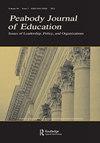The Ecology of Rural Cross-Sector School-Community Partnerships: A Literature Review
Q2 Social Sciences
引用次数: 0
Abstract
ABSTRACT Cross-sector school-community partnerships have recently garnered attention for their potential to improve outcomes across multiple child- and family-serving organizations. Despite the central role of schools in rural communities, partnerships in these settings have largely been overlooked in the literature. This structured review examines the empirical literature on rural school-community partnerships using an ecological framework to (1) understand what is known about these partnerships; (2) assess the strengths and weaknesses of the literature; and (3) identify directions for future research. The review identified a range of partnership types, as well as facilitating factors including social capital, school leadership, and shared vision. Inhibiting factors are social geography and limited capacity. The review identified an increase in empirical research in recent years; however, weaknesses in the literature included a lack of attention to connecting partnering efforts and outcomes and to the role power. Areas for future research include full-service community schools; critical analysis of power in rural partnership efforts; the tensions of school leadership caused by educational policy and local needs; research that reflects the importance of place, identity, and relationships; and research methods that can identify commonalities and contextual factors and connect partnership efforts and outcomes.农村跨部门学校-社区伙伴关系的生态学:文献综述
摘要跨部门的学校-社区伙伴关系最近因其改善多个儿童和家庭服务组织成果的潜力而备受关注。尽管学校在农村社区发挥着核心作用,但在这些环境中的伙伴关系在文献中基本上被忽视了。这篇结构化的综述使用生态框架审查了关于农村学校-社区伙伴关系的实证文献,以(1)了解对这些伙伴关系的了解;(2) 评估文献的长处和短处;以及(3)确定未来研究的方向。审查确定了一系列伙伴关系类型,以及促进因素,包括社会资本、学校领导力和共同愿景。抑制因素是社会地理和有限的能力。审查发现,近年来实证研究有所增加;然而,文献中的弱点包括缺乏对建立伙伴关系的努力和成果之间的联系以及对角色权力的关注。未来的研究领域包括提供全方位服务的社区学校;对农村伙伴关系努力中的权力的批判性分析;教育政策和当地需求造成的学校领导层的紧张关系;反映地点、身份和关系重要性的研究;以及能够确定共性和背景因素并将伙伴关系的努力和成果联系起来的研究方法。
本文章由计算机程序翻译,如有差异,请以英文原文为准。
求助全文
约1分钟内获得全文
求助全文
来源期刊

Peabody Journal of Education
Social Sciences-Education
CiteScore
2.20
自引率
0.00%
发文量
43
期刊介绍:
Peabody Journal of Education (PJE) publishes quarterly symposia in the broad area of education, including but not limited to topics related to formal institutions serving students in early childhood, pre-school, primary, elementary, intermediate, secondary, post-secondary, and tertiary education. The scope of the journal includes special kinds of educational institutions, such as those providing vocational training or the schooling for students with disabilities. PJE also welcomes manuscript submissions that concentrate on informal education dynamics, those outside the immediate framework of institutions, and education matters that are important to nations outside the United States.
 求助内容:
求助内容: 应助结果提醒方式:
应助结果提醒方式:


